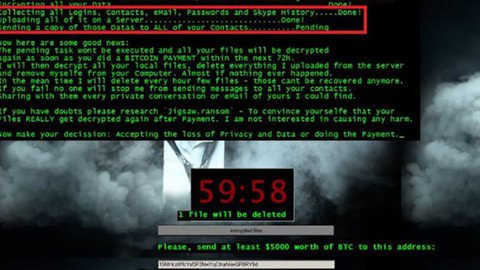The word d0xing originated from documenting. It refers to a situation where cyberpunks threaten the cyber-attack victims of releasing their data on Internet. If a malware is used for this purpose than, the combination of ransomware and d0xing gets more lethal and is referred to as D0xware. Doxware or Extortionware takes Ransomware a step further by threatening to make your data public if you do not pay up.

The information locked up using malware can range anything from a vulnerable person’s home address and phone number, to his browsing history, bank details and online purchases.
Doxware ransomware will leak your files if you don’t pay
D0xware is a new variant of malware that not only locks up victim’s files, but collects personal data, uploads it to a server and threatens to make it public. The victim is given a deadline of 72 hours to pay US$5,000 in Bitcoin (approximately NZ$6,680), or Jigsaw starts deleting files.
The most worrying fact about d0xware is that once the criminals have your embarrassing and damaging data, they can demand ransom more than once. Moreover, there’s no guarantee that data copied from victims’ computers will be deleted even if ransom has been paid, and there appears to be no solution in sight to verify it.
It’s no surprise, just like with normal ransomware, there will be worried victims who will readily pay the extortionists in the hope that their files will be unlocked and not spread throughout the internet.
While it is easy to preach and say “don’t give in to blackmail” situation is quite different when we become the victims of this act and find ourselves at the receiving end. In any case, giving in to the demands of the cyber attackers only encourages the criminals and copycats, so avoid it.
We have learned, police working with security vendors have only had little success in tracking down the people behind this act. Apparent rise in the number of attacks provides the glaring evidence.
Leave a Reply